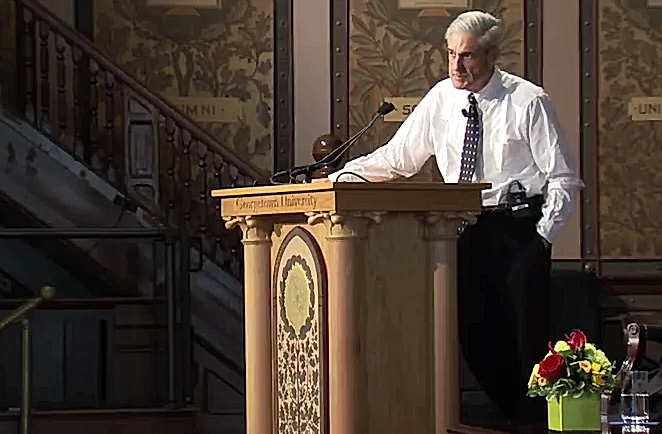One-time FBI Director Robert Mueller got his job as Special Counsel because of a series of suspicious leaks of privileged and perhaps even classified conversations. Can he now be trusted to investigate the leaks that led to him being appointed?
On June 8, Former FBI Director James Comey testified openly, and under oath, that the reason he leaked his memos documenting conversations with President Donald Trump to the New York Times, published May 16, was because he wanted to get a special counsel appointed.
“I asked a friend of mine to share the content of a memo with the reporter. I didn’t do it myself for a variety of reasons, but I asked him to because I thought that might prompt the appointment of a special counsel,” said Comey.
It was a retalitory move by Comey, who used the excuse that he released the memos to the press in response to a tweet by President Donald Trump on May 12. Yet, another New York Times story about the substance of Comey’s meetings with the President covered by the memos had already been published May 11, just two days after Comey had been fired. This discepancy was pointed out by Trump’s attorney, Marc Kasowitz, on June 8.
Right out of the gates, Comey’s stated rationale for bringing forward these memos is being called into question — but focusing too much on the tweet-was-Comey’s-reason narrative might be a mistake and miss the bigger picture.
The real question is why was Comey so intent on getting a special counsel appointed? Ultimately, Comey’s gambit succeeded. He deftly leaked the memos and the New York Times ran with it, attempting to create the potential appearance of obstruction of justice even though Comey knew there was none (he later testified the President has Article II authority to direct investigations). The May 16 story then became the reason for Deputy Attorney General Rod Rosenstein to appoint Mueller as Special Counsel.
So, why was it so important to get Mueller in there to lead the investigation? Other things had to happen first to make it even remotely possible to get a special counsel. Namely, Attorney General Jeff Sessions had to recuse himself.
Interestingly, Comey in his sworn testimony indicated he had foreknowledge or expectation that Sessions would be recusing himself from the Russia investigation. According to the testimony, Comey did not bring up any concerns to do with his Feb. 14 meeting with President Trump, “We concluded it made little sense to report it to Attorney General Sessions, who we expected would likely recuse himself from involvement in Russia-related investigations.”
Who was Comey answering to, if not Sessions, head of the Justice Department? Two weeks later, on March 2, Sessions ultimately did recuse himself from all matters pretaining to the Trump campaign. But why was FBI brass so sure that Sessions would step down? How could Comey have known that?
That is why it may be worth reviewing the circumstances surrounding Sessions’ recusal. On March 1, the Washington Post reported that “Then-Sen. Jeff Sessions (R-Ala.) spoke twice last year with Russia’s ambassador to the United States, Justice Department officials said, encounters he did not disclose when asked about possible contacts between members of President Trump’s campaign and representatives of Moscow during Sessions’s confirmation hearing to become attorney general.”
The source for the story was Justice Department officials, indicating the reason the FBI was so certain Sessions would recuse himself was because somebody at the Justice Department had already manipulated events to guarantee that outcome — by leaking Sessions’ non-campaign-related Senate office meeting with Kislyak.
A day later, Sessions recused himself to avoid any appearance of impropriety. This raises the question of how the Justice Department had learned about his Senate office meeting. Was this another surveillance leak as in the case of Mike Flynn? Something else? Either way, the March 1 Washington Post report hints at the motive for the leak: “The previously undisclosed discussions could fuel new congressional calls for the appointment of a special counsel to investigate Russia’s alleged role in the 2016 presidential election.” Again, with the special counsel angle.
So, why was it so important to remove Sessions from the Russia investigation? And why was the same tactic that was used to remove Sessions from the investigation later used by Comey to get Deputy Attorney General Rod Rosenstein to appoint Mueller to Special Counsel?
These are questions that must be asked as the nation now considers what exactly the scope and purpose of Mueller’s investigation really is. And it must be Mueller and key members of Congress who now must ask those questions.
From the very start, the Justice Department took pains to ensure that this investigation into the Russia matter would remain insulated from the Trump administration and then Trump appointees like Sessions and then Rosenstein. Why?
Were there fears about the Trump team looking at how the investigation has been conducted? Concerns about the unmaskings led by former National Security Advisor Susan Rice? Or the subsequent illegal leaks that clearly got out of hand?
If the Russia investigation turns out to have been a major abuse of power by the Obama adminsitration, can Mueller objectively get to the bottom of it?
A hint could come from a June 11, 2014 speech by Mueller at Georgetown University, where he received a question about the concept of parallel construction — where law enforcement agencies are handed information obtained from warrantless surveillance by intelligence agencies, not unlike the Russia investigation — and then act on it. On its face, the practice appears to run afoul of the Fourth Amendment’s protections against unreasonable searches.
In his remarks, Mueller defended the practice, saying, “Often there are differing ways that you obtain information that may be consistent, may be inconsistent, some may be classified at a different level than others and so long as I am satisfied that it’s within the law and judges have upheld that capability, then I’m okay with it.”
Pressed further on the constitutionality of the practice, Mueller drew a clear distinction between the admissability of such information in a court of law and its acquisition by the law enforcement agency — and its presumed use as a cheat sheet.
“You can acquire information as we do under the FISA statute for instance, but that does not mean it can be used for other purposes without perhaps other judges’ approval… [It] may not be admissable for a variety of reasons but that does not prevent us from acquiring it,” Mueller stated. In other words, the information may not be admissable in court, but that does not mean the FBI cannot read and absorb its content for later use.
So in the case of the Obama adminsitration monitoring of Trump campaign and transition officials, some of which appears to have been a result of warrantless surveillance — and then leaked to the press to inflict political damage on the Trump administration such as the case of Mike Flynn’s own telephone conversation with Kislyak on Dec. 29 — how would Mueller proceed with that inquiry?
Surely going after the leak runs the risk of implicating the warrantless surveillance that was used to obtain the news story. It might even endanger the government’s ability to politically sustain Section 702 of the Foreign Intelligence Surveillance Act, up for Congressional renewal this summer.
Will Mueller pursue leads in the Flynn leak matter, wherever they lead, even if they show that the surveillance authority had been abused by the incumbent party against the opposition party in an election year? Or would he look at the unmaskings as a lawful conduct by government officials and just chalk up that intelligence winding up in the news as an unfortunate incident, and instead use such surveillance against Flynn, perhaps in areas unrelated to his conversation with Kislyak? After all the information was lawfully acquired, in his view.
Based on Mueller’s 2014 comments, he appears to have a bias for the institution he once led at the FBI and a favorable view of these extraconstitutional practices, and so it is reasonable to now question whether he would see anything wrong with how Flynn was taken down. Or how Sessions was compelled to recuse himself.
Or how Mueller himself came to be Special Counsel in the first place, for that matter.
After all, each of these events resulted from classified or privileged communications winding up in the news. Will Mueller investigate Comey’s own leaks to see if there is a pattern with the prior leaks of information that appear designed to damage Trump?
These suspicious leaks that resulted in Mueller landing his current job should be investigated, if not by Mueller, then by Congress. If President Trump or anybody currently in his administration are not even the target of any investigation, why are the American people being subjected to this continued witch hunt?
Robert Romano is the senior editor of Americans for Limited Government.







